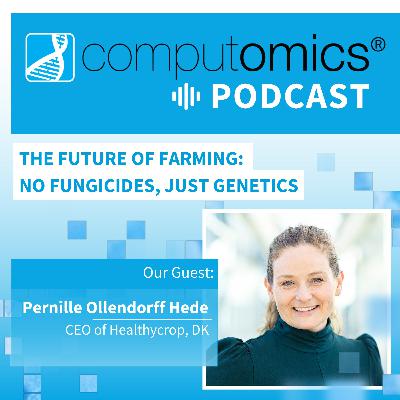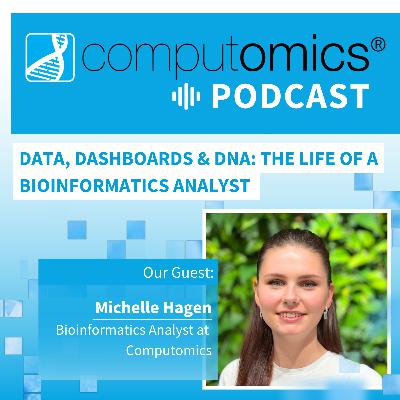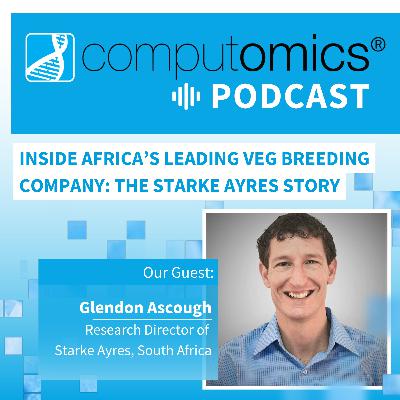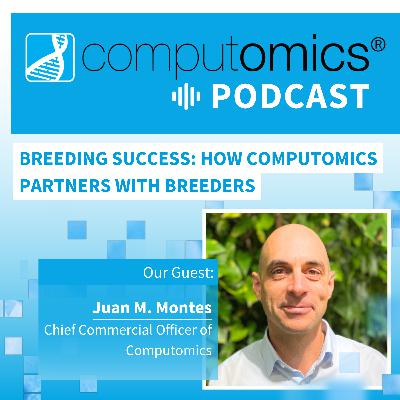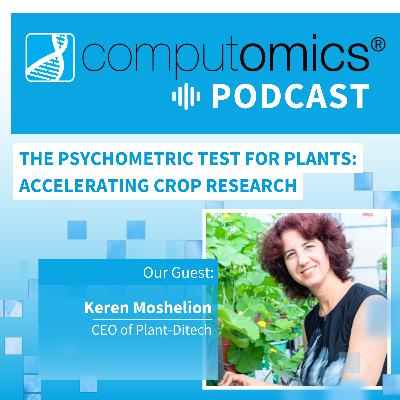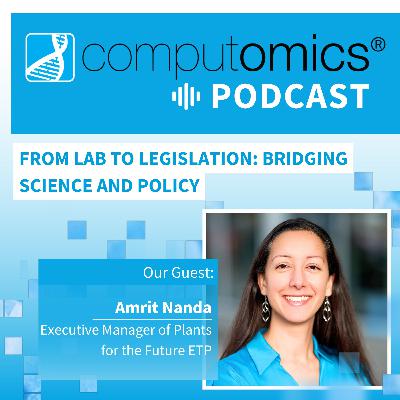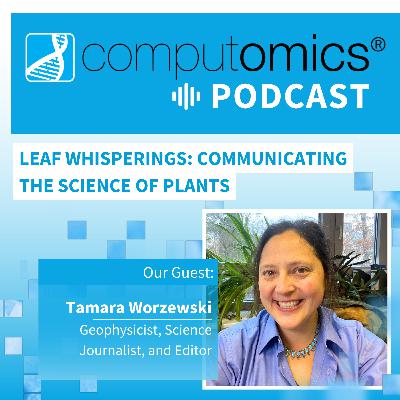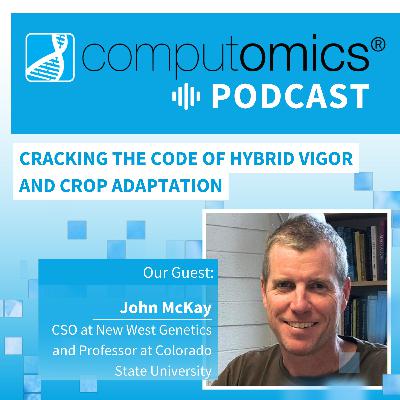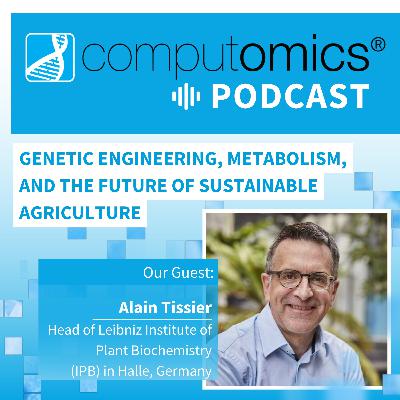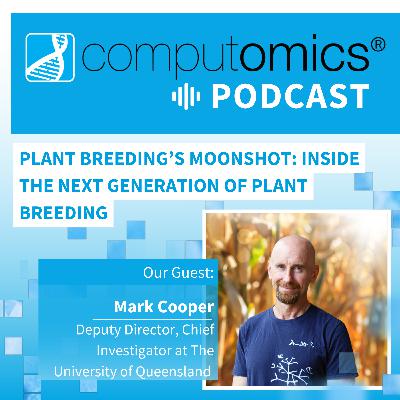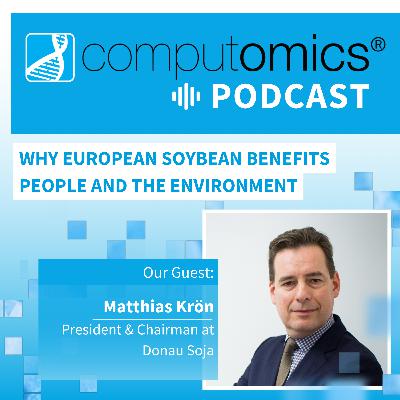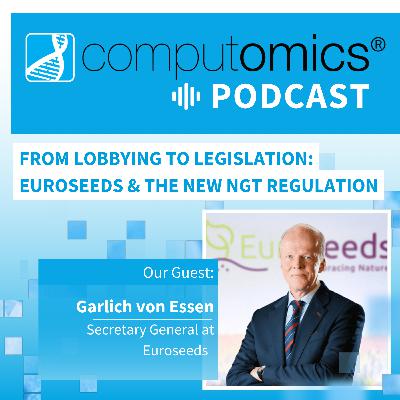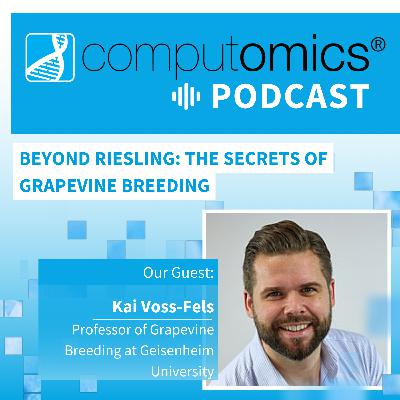Discover Computomics: Discussions On Innovations To Drive Advanced Agriculture Solutions
Computomics: Discussions On Innovations To Drive Advanced Agriculture Solutions

Computomics: Discussions On Innovations To Drive Advanced Agriculture Solutions
Author: Computomics
Subscribed: 12Played: 98Subscribe
Share
© Computomics
Description
Discussions with Computomics and guest speakers on topics covering a wide range from bioinformatics, agriculture, farming, crops, food, to specific research projects. How can new technologies like machine learning facilitate solutions for global food challenges?
76 Episodes
Reverse
In this episode of the Computomics podcast, Pernille Ollendorff Hede, CEO and co-founder of Healthycrop, discusses the company's innovative approach to fungal-resistant crops. Healthycrop boosts the production of Nepenthesin, a naturally occurring enzyme in plants, to degrade fungal enzymes, preventing fungal growth without the need for fungicides. Using cis-genesis and gene editing techniques, Healthycrop enhances the plant's natural defense. While these techniques are classified as genetically modified (GM) in Europe, they are considered non-GM in the U.S. Pernille shares the company's mission to revolutionize agriculture by offering sustainable solutions and hopes for regulatory changes in Europe to facilitate broader adoption.More:Healthycrop - HomepagePernille Ollendorff Hede on LinkedIn
In this episode of the Computomics podcast, bioinformatics analyst Michelle Hagen describes how her work bridges biology and data science. As a data analyst in bioinformatics and plant breeding, Michelle transforms raw genetic and environmental data into insights that guide breeding decisions. She particularly enjoys the teamwork, problem-solving, and creativity involved in her job.Michelle works on Computomics’ Climate-Smart Breeding technology xSeedScore and the Metagenomics Analysis Platform MORPHEUS. Her main tasks involve performing data quality control, running bioinformatics pipelines, and creating interactive dashboards for customers. Her work supports the development of climate-resilient, high-yield crops, and it helps breeders make data-driven breeding faster and more precise.
Glendon Ascough, Research Director at Starke Ayres, discusses the evolution of the company from a historic seed merchant to Africa’s largest independent vegetable breeding company. He shares his personal journey into plant science, driven by a fascination with genetics, and highlights the company’s focus on breeding disease-resistant vegetable varieties tailored to local and international markets. He talks about the collaboration with Computomics, using machine learning to predict sweet corn hybrid performance. Glendon emphasizes the importance of high-quality, diverse phenotypic data and the shift in breeder mindset required for data-driven approaches.
This episode features Dr. Michael Kotutwa Johnson, a Hopi dryland farmer from Arizona’s Colorado Plateau. He shares how his community has grown crops for 3,000 years on just 6-10 inches of annual rain without irrigation. Using deep planting, wide spacing, clumped seeds, and reading native vegetation, Indigenous farming conserves moisture and maintains biodiversity. It yields nutrient-rich crops without chemicals, protects soil, and integrates spiritual traditions. Climate change impacts - shorter summers, longer winters, less precipitation - are addressed by adapting planting practices and trusting in seed adaptation through continual cultivation. Michael advocates for growing seeds annually to keep them climate-resilient, and for revitalizing Indigenous food systems to combat health crises like diabetes. Beyond yields, the Hopi system offers values of stewardship, sharing, and hope, which he believes can inspire global agricultural approaches.More:"Dr. Hopi Farmer" on InstagramMichael K. Johnson on LinkedInIndigenous Resilience CenterIndigenous Landscapes: An example from Hopi (Lecture)
In this Computomics podcast episode, Computomics Chief Commercial Officer Juan Manuel Montes shares insights into his passion for learning and his recent experience at the International Seed Federation conference in Istanbul. He discusses industry challenges like climate change and consumer demands, highlighting how Computomics supports plant breeders with technologies like xSeedScore and Pantograph. These tools accelerate variety development and genomic analysis. Juan emphasizes the company’s customer-centric approach, tailoring solutions for clients of all sizes through strategic collaboration. The episode wraps up the current season, with new content returning in September.
Our guest in this episode is Keren Moshelion, CEO and co-founder of Plant-Ditech. Karen shares insights into the company’s advanced plant phenotyping platform. The system simulates stress conditions like drought, salinity, and nutrient variability, measuring plant responses with high-resolution sensors up to 500 times a day. These real-time measurements help researchers rapidly assess plant productivity, growth, and water use efficiency. It enables them to customize treatments per plant and analyze physiological traits linked to yield. Designed for greenhouses and growth chambers, the platform significantly accelerates agtech R[&]D, with customers reporting time savings of up to two years. The company's clients use the system for both academic and commercial research.
Our guest in this episode is Kinneret Shefer, co-founder and CEO of AgTech startup GeneNeer. Kinneret shares the founding of GeneNeer, driven by her shift from pure RNA research to market-driven innovation. GeneNeer aims to revolutionize crop breeding by drastically shortening trait development time using fast, tissue culture-based gene editing platforms. Kinneret compares her vision for GeneNeer to Pfizer's rapid vaccine development during COVID-19, enabling fast responses to agricultural challenges like drought or new pests. GeneNeer's "super line" platform allows rapid, iterative trait development with backup options, while their AI-supported platform enables precise, tissue- and time-specific gene editing without introducing foreign DNA. GeneNeer's business model includes custom collaborations and independent product development.More:GeneNeerKinneret Shefer on LinkedIn
In this episode of our podcast Amrit Nanda, Executive Manager of Plants for the Future ETP, discusses the importance of plant breeding, public-private collaboration, and science-based policymaking in the EU. She highlights the platform’s mission to connect academia, industry, and policymakers, and to improve science communication through initiatives like “Plantastic Discoveries.” A recent study on 20 years of EU research funding revealed limited growth for plant breeding despite strong overall program growth. Amrit stresses the need for long-term funding models, more support for Eastern Europe, and the potential of gene editing and AI.
Our new episode explores science communication with Tamara Worzewski, focusing on overcoming "plant blindness" and engaging the public with plant-related topics. Tamara highlights the importance of storytelling in making science accessible and building trust between scientists and the public. Topics range from Arctic ecosystems to public outreach strategies, emphasizing creative ways to connect people with plants and nature. Titles like “Plants, Stories, and Science” and “Breaking Plant Blindness” reflect this blend of narrative and education. The conversation inspires innovative approaches to connecting people with science.More:The term-defining publication on “Plant Blindness” Plant Science Café, Sofa Events, and more"Best of" movies by BlattgeflüsterBlattgeflüster websiteBlattgeflüster on Instagram Tamara’s freelancer website
In this episode, John McKay, Chief Scientific Officer at New West Genetics and professor at Colorado State University, discusses his research on local adaptation, genotype-by-environment interactions, and heterosis. His work spans crops like maize, rice, and hemp, applying evolutionary genetics to improve breeding strategies. John's projects aim to enhance crop efficiency and sustainability.More information:New West Genetics hybrid hempGenetic basis of plant root growth traits and their response to environment (current NSF grant)National Science FoundationConditional neutrality in Arabidopsis local adaptationGxE in maize root traits
Our guest in this episode of the Computomics Podcast is Alain Tissier, Managing Director at the Leibniz Institute of Plant Biochemistry. He discusses his research focusing on the molecular mechanisms in plants, particularly the interaction between primary and secondary metabolism and how plants produce chemical compounds for defense and communication. Alain talks about on his work in metabolic engineering and genome editing, particularly using a novel CRISPR-based technology to introduce specific genetic changes in plants. Hear about the INNO-TOM project which uses pangenomes to breed disease-resistant and nutrient-enriched tomatoes.
In this episode, Gabriele Berg, a renowned microbiome researcher, discusses her work on microbial communities and their impact on health and planetary ecosystems. She emphasizes the interconnectedness of microbiomes in plants, soil, and humans, and aims to enhance ecological and human health. The project An Apple a Day revealed the microbiome's role in apple health, highlighting microbial diversity within the fruit. Gabriele also talks about Tiny Biome Tales, an educational microbiome-focused game integrating science and public outreach. She advocates soil health restoration, stressing its importance for sustainable food systems. Also, collaboration, innovation, and science communication being key to impactful research.
More information:
https://www.tugraz.at/en/institutes/ubt/home
https://www.atb-potsdam.de/de/ueber-uns/team/mitarbeiter/person/gabriele-berg
Gabriele Berg: What is a microbiome? https://www.youtube.com/watch?v=3K7FavVORLo
Tiny Biome Tales: https://enviromicro-journals.onlinelibrary.wiley.com/doi/10.1111/1751-7915.14544
Tiny Biome Tales - the game: https://microbiome.gamelabgraz.at/
An Apple A Day: https://www.frontiersin.org/journals/microbiology/articles/10.3389/fmicb.2019.01629/full
ISME: https://isme-microbes.org/
This episode is all about reducing the Nitrogen footprint of wheat. Wheat is the world’s largest ‘crop’ consumer of nitrogen-based fertilizer, while providing affordable calories to billions of resource-poor people and ca. 20% of globally consumed protein. Victor Kommerell is the CropSustaiN Mission Director of the BNI (Biological Nitrification Inhibition) wheat initiative launched by the Novo Nordisk Foundation and CIMMYT. The initiative aims to develop new wheat varieties capable of reducing agriculture’s nitrogen footprint. In this enjobyable episode, hear from Victor not only about this ambitious new research initiative, but also about his very unsusual career path and his take on sabbaticals.
More:
https://www.cimmyt.org/projects/cropsustain-bni-wheat-mission/
https://novonordiskfonden.dk/en/news/new-innovative-crops-could-significantly-reduce-agricultures-climate-change-impact-and-environmental-footprint/
https://www.cimmyt.org/news/new-innovative-crops-could-significantly-reduce-agricultures-climate-change-impact-and-environmental-footprint/
https://www.lehmanns.de/shop/reisen/14888833-9783842306974-die-wandlungsreise
This episode delves into the world of plant phenotyping. Kerstin Neumann shares her insights from managing a very diverse phenotyping infrastructure. Here, field-like growth is enabled under strictly controlled conditions, including setups to measure abiotic stresses. She explains how this enables the non-invasive tracking of plant growth and the involved genomic regions. The conversation also sheds light on INCREASE, a large European project including a Citizen Science Experiment led by Kerstin, now in its 5th year. INCREASE generates phenotypic data for an extensive collection of common bean varieties - with the help of citizens all over Europe who contribute to data collection in an unprecedented number of different locations.
More:
https://www.ipk-gatersleben.de/en/research/molecular-genetics/automated-plant-phenotypinghttps://www.pulsesincrease.eu/https://calls.ars.electronica.art/2024/prix/winners/12961/
This episode delves into the world of plant breeding with Professor Mark Cooper. Mark shares insights from his extensive experience in the industry, highlighting the importance of data-driven approaches, computational power, and strategic partnerships. The conversation also sheds light on the ongoing collaboration between Mark's research team and Computomics, focusing on leveraging advanced data analytics and AI to accelerate breeding processes. The episode concludes with a discussion on the future of plant breeding, emphasizing the potential for rapid technological advancements and the importance of data-driven approaches.Professor Mark Cooper is Chair of Prediction Based Crop Improvement at The University of Queensland, and a global leader in quantitative genetics and plant breeding. His work involves integrating genomic prediction and crop growth models into an ‘end to end’ framework for crop improvement. A quantitative geneticist by training, Professor Cooper spent 20 years working with industry in the United States and as CEO of his own consultancy firm Zenrun42, before returning to UQ to build upon the critical mass of predictive agricultural expertise in QAAFI and the wider university.
More:https://www.plantsuccess.org/Genotype by Environment by Management (GxExM) Symposium III
In this episode Nadine Ziemert, professor for translational genome mining at the University of Tübingen, explores the urgent need for new antibiotics due to rising antibiotic resistance. Gain profound insights on how researchers are using bacterial genomes to predict and discover novel antibiotics. Discover the potential of leveraging machine learning to develop innovative approaches in antibiotics discovery and what role the largely untapped soil microbiome plays. Learn about the ambitiuos mission of the BGC (Biosynthentic Gene Clusters) atlas, a global community project aimed at maping the genetic basis of the chemistry in all kinds of metagenomes present around the world.
Nadine Ziemert received her Diploma and PhD degrees from the Humboldt University in Berlin, followed by a postdoc and project scientist position at the Scripps Institution of Oceanography in La Jolla, California. Since 2015, she is a Professor at the University of Tübingen, where she leads an interdisciplinary research group focusing on genome mining approaches and the evolution of secondary metabolites in bacteria and their diverse functions. Her work focuses on developing bioinformatic tools for the discovery of natural products from microbial genomes, elucidating the evolutionary history of their biosynthetic gene clusters and tracing their distribution in the environment.
More:Ziemert LabBCG Atlas BCG World Atlas
In this episode, Matthias Krön, delves into the inception of Donau Soja, its mission, and its pivotal role in European soy production. Discover the intricacies of protein production and consumption in Europe, and the potential for transitioning from imported soy to European soy to substantially reduce CO2 emissions. Gain insights into how our agricultural system has inadvertently fostered a culture of overconsumption.
Matthias Krön was born in Salzburg in 1969. He studied Chinese studies, philosophy and history in Vienna and Taipei. Subsequently he spent one year at the Leo Baeck Institute in New York. After his return to Austria in 1995 he started working in the dairy sector for milk variants based on soy, rice and oats in Austria. Krön acted as CEO and partner of the Mona Group, stepping down as CEO in fall 2011 to concentrate on the soy associations. The Austrian soya association was founded in 2008 as an initiative of the Austrian soy businesses. In spring 2012 the International Danube Soya association was established.Krön now serves as President of the Donau Soja association and advocates a sustainable and regional protein supply in Europe.
Shownotes:
Donau Soja
Legume Hub
In this episode, Garlich van Essen, Secretary General at Euroseeds discusses the brand new regulation on New Genomic Techniques (NGT). Discover the intricacies of the NGT regulatory framework, from its impact on plant breeding to the distinctions between NGT and GMO. Uncover the power of lobbying and understand how Euroseeds acts as the eyes and ears of the European Seed sector. Get insights on the evolving Euroseeds Congress in Copenhagen and what changes and innovations to expect.
More:
EuroseedsInnovaction Stage at Euroseeds Congress
Garlich is German and studied Agriculture and Economics at the University of Göttingen. He started his professional career in the European Commission’s DG Agriculture before graduating in Administrative and Political Sciences from the College of Europe. Before joining the seed industry in 1999, he worked in the European Parliament in agricultural and structural policy, specifically on the EU’s R[&]D policy and funding instruments. Joining ESA as Director Public Affairs, he became Secretary General in 2004.In Euroseeds, Garlich takes responsibility for the overall management of the association and its staff, the development of strategic policy campaigns on Euroseeds’ priority issues and the positioning of Europe’s seed industry vis-à-vis EU and international bodies and decision makers.
In this episode with Kai Voss-Fels we dive into the complex world of grapevine breeding. Discover the unique challenges of breeding grafted crops. Enhancing genetic gain becomes multifaceted due to the fact that grapevines consist of two genetically distinct parts, the scion (upper) and rootstock (lower). Our discussion centers on addressing challenges such as water limitation, and drought stress for the lower section, while simultaneously focusing on improving sustainability by introgression of resistances in the uppper part. Moreover, we explore the ACGG (Accelerating Crop Genetic Gain) program, an international research initiative funded by the DFG in Germany, aimed at training PhD students and postdocs to tackle different questions with relevance to speeding up the varietal development process.
Kai Voss-Fels is Professor of Grapevine Breeding at Geisenheim University where he leads a team of researchers, students and technical staff working on genetics, genomics and breeding of grapevine. After completing his PhD in plant breeding and quantitative genetics at Justus Liebig University Giessen in 2016, he was a senior research fellow and group leader at the University of Queensland, Australia from 2017-2021. In 2021, he moved to Geisenheim University to develop a new research program focussed on genomics-assisted rootstock improvement and clonal selection in grapevine.
More:
Department of Plant Breeding, HS Geisenheim
ACGG (Accelerating Crop Genetic Gain
In this episode Jörg Hagmann, Product Manager Pantograph, explores the concept of pangenomes, a collection of individual whole genome sequences. Discover the reasons why pangenomes and their associated research field is experiencing growth and increasing significance. Jörg discusses the vision behind the development of the interactive browser Pantograph and illustrates practical applications in pre-breeding and the identification of gene editing targets. Join us as we delve into the landscape of DNA exploration and the promising future of genomic navigation with Pantograph.
Dr. Jörg Hagmann, Product Manager Pantograph, joined Computomics 8 years ago. He studied Bioinformatics at University of Tübingen and McGill, Montréal, and graduated with researching the evolution of epigenetic marks in plants at the Max Planck Institute for Developmental Biology, Tübingen. Besides his broad
experience in multiple omics data analysis, Jörg is now working on propelling the representation, use, and visualization of pangenomes forward. He develops a
novel interactive pangenome browser called Pantograph.
Contact Jörg for more information: joerg.hagmann@computomics.com
Pantograph


